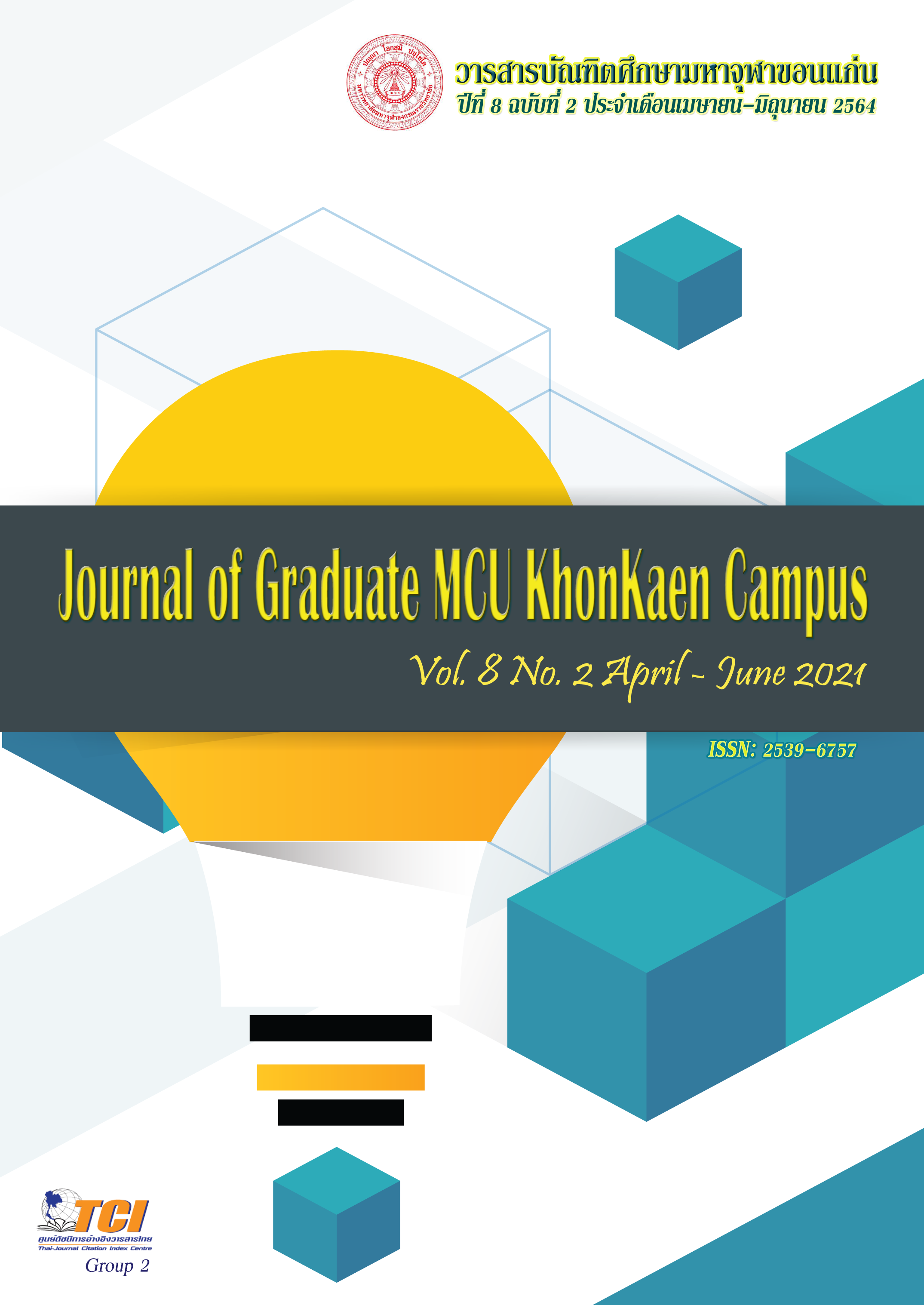AN ANALYTICAL STUDY OF BUDDHIST EPISTEMOLOGY IN FOUNDATIONS OF MINDFULNESS
Main Article Content
Abstract
Dissertation on this subject It has three objectives: (1) to study Buddhism Epistemology (2) to study Mindfulness 4 (3) to analyze Buddhist Epistemology in Mindfulness 4 This study is a documentary research. By studying information from Buddhist scriptures and related documents, compiling, compiling and describing descriptive.
The research results are as follows:
1. Buddhism Epistemology is a theory of knowledge in Buddhism that divides knowledge into 3 types: 1) Jintamayapanya, wisdom that is born only to think and think and rationalize. (Yonitsamanasikarn) 2) Sutamayapanya, which arises from listening to external studies or from Kanlayanamit (Paratochosa) 3) Phawanamapanya, wisdom was born only from the inheritance of the two and then brought into training. In addition, Buddhist Epistemology also classified knowledge into two categories, namely knowledge in the form of assumptions, truth is the truth that the world assumed to be used in groups, and the knowledge of the Pramatha Truth is knowledge. Knowing the reality of nature that arises and goes away.
2. Mindfulness base 4 is the base of mindfulness or the establishment of mindfulness, determination, and consideration of the circumstances that occur in the body, the mind, and the dharma, which is the subject of the ordinary nature of the natural being born with consciousness as the person Determined to be considered to be aware of the occurrence and possibility of things.
3. Buddhist epistemology in mindfulness It is knowledge that arises from the process of internal and external sense of impact, thus it is knowledge that arises from wisdom. Jintamayapanya Sutamayapanya and Phawanamapanya, which these 3 faculties are interrelated, therefore, are the body of knowledge in determining consciousness 4, namely 1) determining the physical state in the body 2) determining the state that arises in distress, 3) determining the state of the mind, and 4) determining the state in the dharma.
Article Details
References
จักรพรรณ วงศ์พรพวัณ. (2560). ศึกษาวิเคราะห์การพัฒนาปัญญาตามแนวพุทธจริยศาสตร์ของสำนักปฏิบัติธรรมในจังหวัดขอนแก่น. รายงานวิจัย. สถาบันวิจัยพุทธศาสตร์: มหาวิทยาลัยมหาจุฬาลงกรณราชวิทยาลัย.
ทรงวิทย์ แก้วศรี. (2532). มหาจุฬาฯ วิชาการ ปรัชญาบุรพทิศ. กรุงเทพมหานคร: อมรินทร์ พริ้นติ้งกรุ๊พ จำกัด.
บุญมี แท่นแก้ว. (2545). พุทธปรัชญาเถรวาท. กรุงเทพมหานคร: สำนักพิมพ์โอเดียนสโตร์.
พระพรหมคุณาภรณ์ (ป.อ.ปยุตฺโต). (2559). พุทธธรรม ฉบับขยายความ. (พิมพ์ครั้งที่ 45). กรุงเทพมหานคร: สำนักพิมพ์ผลิธัมม์.
พระโสภณมหาเถระ (มหาสีสยาดอ). (2555). มหาสติปัฏฐานสูตร ทางสู่พระนิพพาน. พระคันธสาราภิวงศ์ แปลและเรียบเรียง. กรุงเทพมหานคร: ประยูรสาสน์ไทยการพิมพ์.
พระจำลอง สุภาจาโร. (2559). ธัมมานุปัสสนาตามแนวสติปัฏฐานสูตรในพุทธปรัชญาเถรวาท: ศึกษาเชิงวิเคราะห์. วารสารพุทธมัคค์, 1(1), 17.
มหาวิทยาลัยมหาจุฬาลงกรณราชวิทยาลัย. (2539). พระไตรปิฎกภาษาไทย ฉบับมหาจุฬาลงกรณราชวิทยาลัย. กรุงเทพมหานคร:
โรงพิมพ์มหาจุฬาลงกรณราชวิทยาลัย.
ราชบัณฑิตยสถาน. (2532). พจนานุกรมศัพท์ปรัชญาอังกฤษ-ไทย. กรุงเทพมหานคร: อมรินทร์พริ้นติ้ง กรุ๊พ จำกัด.
สถิต วงศ์สวรรค์. (2543). ปรัชญาเบื้องต้น. (พิมพ์ครั้งที่ 2). กรุงเทพมหานคร: สำนักพิมพ์รวมสาส์น.

